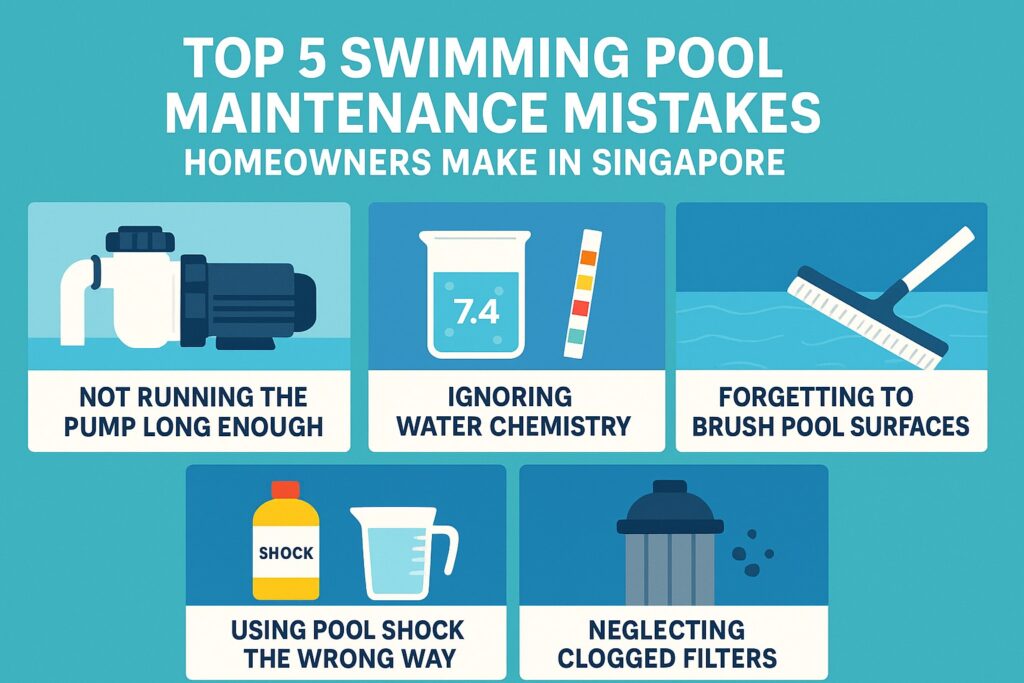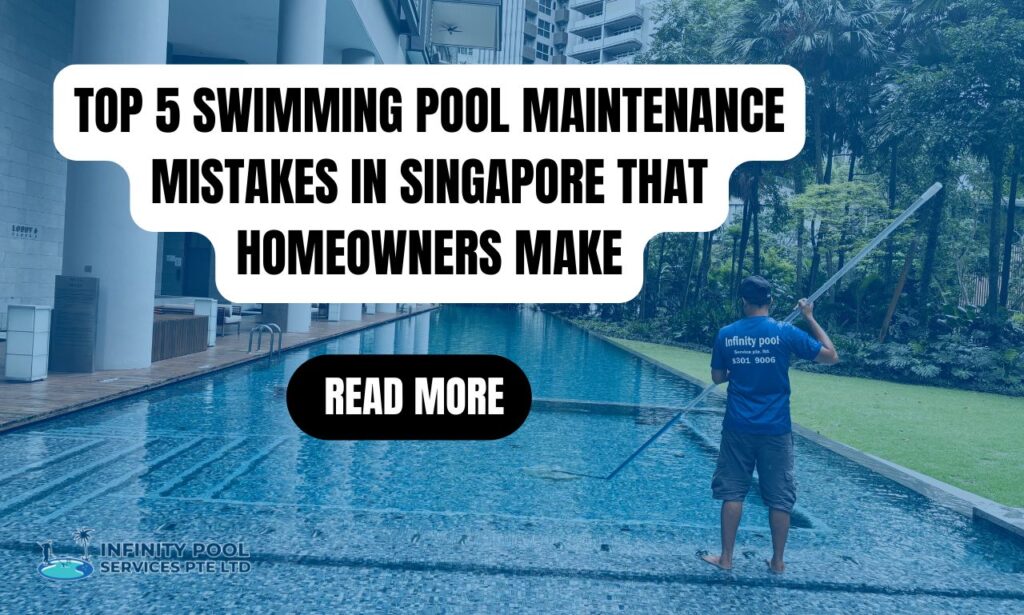You know how nice it feels to jump into your pool after a hot day in Singapore. The cool water, the peace, and the fun with family. It’s the best part of home life. But keeping that pool clean and healthy is not always simple. Many people don’t notice the small things they do wrong in pool maintenance until the water turns cloudy or the pump starts making noise. That’s why we’ve come up with the top five swimming pool maintenance mistakes in Singapore that homeowners make.
These pool maintenance mistakes start small but cause big trouble later. Here’s a quick look at what really happens when you make them. You’ll also see easy ways to fix each one so your pool stays clear, fresh, and ready for a good swim anytime. Let’s get started.

Here are the Top 5 Swimming Pool Maintenance Mistakes in Singapore That Homeowners Make
Let’s go through the top five swimming pool maintenance mistakes homeowners in Singapore make, what problems they cause, and how you can avoid them.
1. Not Running the Pool Pump Long Enough
Your pool pump is like the heart of your pool. It keeps the water moving and clean. Many homeowners don’t run it long enough each day.
Why it’s a mistake:
- In Singapore’s warm and humid weather, still water can get cloudy or green fast. Without enough circulation, algae grow quickly, and the water becomes unsafe.
What might happen:
- Algae blooms and dirty water
- Poor filtration and a bad smell
- You use more chemicals to fix the problem
How to fix it:
- Run your pool pump for 8 to 12 hours a day, especially during hot months or heavy use. This keeps the water moving, filters out dirt, and balances chemicals.
Pro help:
- If you are not sure how long your pump should run or what size you need, a pool technician can check your pool and tell you exactly what to do.
2. Ignoring Water Chemistry
Many homeowners skip regular water testing. In Singapore’s tropical climate, water changes fast because of rain, sun, and heat.
Why it’s a mistake:
- If you don’t check pH, chlorine, and alkalinity, the water can become unsafe. It can also damage your pool system.
What might happen:
- Eye or skin irritation
- Algae growth
- Damage to tiles, ladders, and metal parts
How to fix it:
- Test your pool water at least once a week. Keep pH between 7.2 and 7.8. Keep chlorine between 1 and 3 parts per million. Always test before adding chemicals.
Pro help:
- A pool expert can test your water in detail. They can balance it with professional tools. Services like Infinity Pool Services Pte Ltd in Singapore can make sure your water is perfect.
3. Forgetting to Brush Pool Surfaces
Most people vacuum the pool floor but forget the walls, steps, and corners. That is where algae love to hide.
Why it’s a mistake:
- Even if the water looks clear, slimy layers can form on pool walls. Once algae sticks, they are hard to remove.
What might happen:
- Slippery or green pool walls
- Bacteria buildup
- Chemicals don’t work as well
How to fix it:
Brush your pool surfaces at least once a week. Use the right brush:
- Nylon brush for vinyl or fibreglass pools
- Stainless steel brush for concrete or plaster pools
Pro help:
- Professional cleaners use strong brushes and tools. They can clean corners and tile lines that are hard to reach on your own.
Keeping up with your pool regularly can save you money and avoid big repairs. Learn why regular pool maintenance saves you money long-term in our detailed guide.
4. Improper Pool Shocking
Shocking the pool kills bacteria and clears cloudy water. But many people pour shock directly into the pool without dissolving it first.
Why it’s a mistake:
- Raw shock chemicals can bleach or damage the pool surface. They also don’t spread evenly.
What might happen:
- Damaged pool liner or faded tiles
- White spots on the surface
- Algae still stays even after shocking
How to fix it:
- Dissolve the shock in a bucket of water first. Pour it evenly around the pool. Brush the pool afterward to spread it well.
Pro help:
- If you don’t know how much shock to use, a professional can test your water and give the exact amount.
5. Ignoring Clogged Pool Filters
Your filter keeps your pool water clear. In Singapore, it can get clogged easily by leaves, dust, and rain.
Why it’s a mistake:
- A blocked filter makes the pump work harder. The water gets dirty quickly.
What might happen:
- Poor water circulation
- Cloudy water and algae growth
- Pump motor damage and higher electricity bills
How to fix it:
- Clean or backwash your pool filter every week, especially after storms or heavy use. Check the pressure gauge. If it’s high, clean it.
Pro help:
- A professional can inspect the system, clean filters deeply, and replace old parts. This stops small issues from becoming big problems.
Besides, if you want to know about how much regular pool care and equipment replacement costs in Singapore, check out our guide on swimming pool maintenance and equipment replacement costs in Singapore.
When Should You Call a Pool Professional in Singapore
Sometimes, even when you do everything right, things still go wrong. If the water keeps turning green, if the pump makes noise, or if the chemicals never seem right, call a reliable, affordable, and experienced swimming pool maintenance & repair company. A pool expert can test, clean, and fix your system properly. They’ll also find small issues before they become expensive problems. It’s always better to get help early than to fix damage later.
Wrapping Up
So, after learning about the above top 5 swimming pool maintenance mistakes in Singapore that homeowners make, hopefully, you can now take care of your pool easily. Don’t skip brushing, testing, or running the pump. These small habits make a big difference. And remember, if something feels off, don’t wait. Call a professional. That’s how you keep your pool clean, healthy, and ready for a relaxing swim anytime.
FAQs
You should check your pool water at least once a week. Testing helps you know the pH, chlorine, and alkalinity levels. This keeps the water safe, clear, and healthy for swimming without surprises.
- Can I use my pool right after adding chemicals?
It is better to wait before swimming after adding chemicals. Chlorine and shock need time to mix and work properly. Waiting a few hours keeps your skin and eyes safe and the water balanced.
- How do I know if my pool pump is working well?
Check the water flow and listen to the pump. If the water is moving steadily and the pump is quiet, it is working fine. Strange noises, weak flow, or leaking issues in your pool mean you should call a professional.
- Is it normal for my pool water to turn cloudy sometimes?
Yes, cloudy water can happen after rain, heavy use, or skipped cleaning. It usually clears after running the pump and checking chemicals. If it stays cloudy, you may need to clean the filter or adjust the water balance.
- How can I prevent algae from coming back in my pool?
Regular brushing, running the pump, and keeping chemicals balanced stop algae from growing. Don’t skip cleaning walls and corners, and check water levels often. These small steps keep your pool safe and green-free.
- Do I need a professional to clean my pool every month?
Not always, but a professional can help catch hidden problems. They can deep-clean, inspect filters, and balance chemicals properly. Even one visit every few months saves time and prevents bigger issues later.

